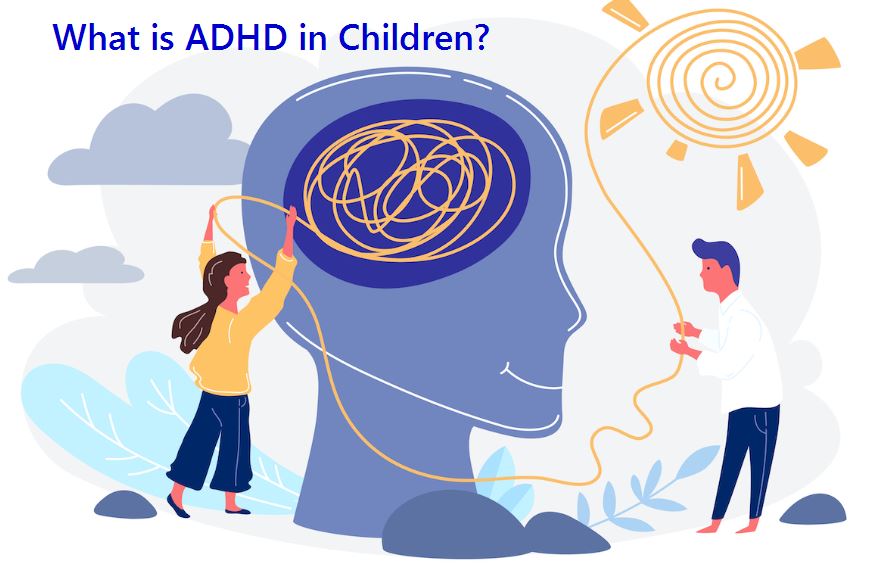Introduction- ADHD in ChildrenADHD in Children
One of the most prevalent neurodevelopmental diseases in children is ADHD. It is first identified in infancy and often continues throughout adulthood. Children with ADHD may struggle to focus, manage impulsive actions (doing without considering the consequences), or exhibit excessive activity.
Signs and Symptoms
Children often struggle with attention and conduct on an occasional basis. Children with ADHD, however, do not just outgrow these habits. The symptoms linger, can get worse, and might make it hard to go to school, stay at home, or hang out with friends.
ADHD in Children might have symptoms like
- Daydreaming is common.
- Forget or misplace items a lot fidget or wriggle excessively speak make thoughtless errors or take needless risks
- struggle to avoid temptation and struggle to take turns
- Finding it difficult to get along with people
Types of ADHD in Children
Depending on which particular symptom category the person exhibits the most, there are three different forms of ADHD:
Inattentive:
The person finds it difficult to focus on details, follow directions or discussions, arrange or complete tasks. The individual is often sidetracked or forgets the specifics of everyday activities.
Hyperactive-Impulsive:
The person fidgets and talks a much. It might be difficult to sit motionless for long periods, including during meals or study sessions. Younger kids may run, jump, or climb all the time. The person exhibits restlessness and suffers from impulsivity.
Impulsive people usually talk improperly, interrupt others, and steal things from them. The individual struggles to wait their turn or comply with directions. For some people, impulsivity may result in more accidents and injuries than not.
Combined:
The person has equal amounts of the symptoms from the first two categories.
Causes of ADHD in Children
Scientists are examining the cause(s) and risk factors of ADHD to enhance management and reduce the possibility that a person may have the illness. Despite the lack of clarity surrounding the precise cause(s) and risk factors of ADHD, current research has revealed a large inherited component. Recent studies connect genetic factors to ADHD.
Researchers are looking into risk factors and other possible reasons for ADHD in Children than genetics, like:
- brain damage
- Childhood or pregnancy exposure to environmental risks, such as lead Use of smoke and alcohol when pregnant
- early birth
- low birth weight
Research refutes popular views that attribute ADHD to parenting, sugar intake, excessive television watching, or social and environmental factors including poverty or chaotic families. These and other circumstances might make symptoms of ADHD in Children worse, especially for certain people. To conclude that these are the main causes of ADHD, though, would require more research.
Diagnosis
Determining if a child has ADHD is a multi-step approach. A single test cannot identify ADHD in Children; instead, several different diseases, such as anxiety, depression, sleep problems, and specific types of learning challenges, might have symptoms that are similar to ADHD.
One step in the process that helps rule out other problems with symptoms, such as ADHD, is a medical evaluation that includes tests for vision and hearing. In addition to a checklist intended to assess symptoms, a history of the kid’s interactions with parents, teachers, and even the child themselves may be used to diagnose ADHD.
Treatments for ADHD in Children
Child psychologist addressing the family
A combination of medication and behavior therapy is typically the most successful approach to treating ADHD. For preschool-aged children (4-5 years old) with ADHD, behavior therapy—especially parent education—is recommended as the first line of treatment before considering medication.
What works best may change based on the child and household. Regular assessments, follow-ups, and any required modifications made along the road are all essential components of effective treatment programs.
Handling Symptoms: Maintaining Well-Being
All children need to be healthy, but children with ADHD may need to be more careful about their health. A healthy lifestyle can help your kid manage the symptoms of ADHD in addition to behavioral treatment and medication. The following healthy habits might be beneficial:
- forming a balanced diet that includes selecting lean protein sources and consuming plenty of fruits, vegetables, and complete grains
- Depending on age, engaging in regular physical activity
- reducing the amount of time spent each day using screens for phones, laptops, TVs, and other devices
- obtaining the appropriate sleep each night for one’s age
Conclusion
You can take your kid to a specialist, such as a Child Psychologist, or Child Psychiatrist, if you are concerned about ADHD in Children
Children with ADHD may experience difficulties focusing and paying attention. However, getting support from parents, leading a healthy lifestyle, and attending therapy can all help a child manage their symptoms.
Select the best option for your child with the assistance of their teachers and an ADHD therapist.
If you’re searching for a “Child Therapist near Me,” you may try TalktoAngel, an online directory that provides qualified and experienced child ADHD therapists who promote a child’s development.
